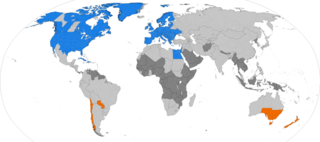
A time zone is an area which observes a uniform standard time for legal, commercial and social purposes. Time zones tend to follow the boundaries between countries and their subdivisions instead of strictly following longitude, because it is convenient for areas in frequent communication to keep the same time.

Egypt Standard Time (EGY) is UTC+02:00, which is equivalent to Eastern European Time, Central Africa Time, South African Standard Time and Central European Summer Time, and is co-linear with neighbouring Libya and Sudan. Egypt has used Eastern European Summer Time (UTC+03:00), during the summer periods from 1957 to 2010, 2014, 2015, and 2023.

The time zone in Germany is Central European Time and Central European Summer Time. Daylight saving time is observed from the last Sunday in March to the last Sunday in October. The doubled hour during the switch back to standard time is named 2A and 2B.

Pakistan uses one time zone, which is Pakistan Standard Time (PKT). This is UTC+05:00 — that is, five hours ahead of Coordinated Universal Time.
Samoa uses UTC+13:00 as standard time. Until the end of 2011, it used UTC−11:00 as standard time. Samoa observed daylight saving time from 2010 to 2021.

Daylight saving time (DST), also known as summer time, is the practice of advancing clocks during part of the year, typically by one hour around spring and summer, so that daylight ends at a later time of the day. As of 2024, DST is observed in most of Europe, most of North America and parts of Africa and Asia around the Northern Hemisphere summer, and in parts of South America and Oceania around the Southern Hemisphere summer. It was also formerly observed in other areas.
Bosnia and Herzegovina uses a single time zone, denoted as Central European Time. It also observes summer time, shifting to Central European Summer Time.
All of the U.S. state of Alabama is in the Central Time Zone and observes daylight saving time.
Uruguay is located at a longitude appropriate for a UTC−04:00 time zone offset, but it actually uses a UTC−03:00 offset. Uruguay used to observe daylight saving time (UTC−02:00) from October until March. On 30 June 2015, the Uruguayan government decided to abolish DST, establishing the UTC−03:00 time zone all year round. The term "UYT" is used in and out of the country to convey specific Uruguay time.
Time in Vanuatu is given by Vanuatu Time. Vanuatu does not currently observe daylight saving time. Vanuatu previously observed DST (UTC+12:00) between 1 September 1983 until 1993.
In Slovakia, the standard time is Central European Time (UTC+01:00). Daylight saving time is observed from the last Sunday in March to the last Sunday in October. This is shared with several other EU member states.

In Romania, the standard time is Eastern European Time. Daylight saving time, which moves one hour ahead to UTC+03:00 is observed from the last Sunday in March to the last Sunday in October.

Time in Lithuania is given by Eastern European Time. Daylight saving time, which moves one hour ahead to UTC+03:00 is observed from the last Sunday in March to the last Sunday in October. Latvia adopted EET in 1920.

The western African country Ghana observes a single time zone, denoted as Greenwich Mean Time. Ghana shares this time zone with several other countries, including fourteen in western Africa where it was formerly known as Western Sahara Standard Time (WSST). Ghana does not have an associated daylight saving time (DST). It previously observed DST as the erstwhile Gold Coast under British rule between 1919 and 1942, and 1950 and 1956.
Time in Sudan is given by a single time zone, officially denoted as Central Africa Time. Sudan has observed CAT since 1 November 2017. Sudan has not observed daylight saving time since 14 October 1985.
Time in Eritrea is in a single time zone, officially denoted as East Africa Time. Eritrea has never observed daylight saving time. It has consistently observed EAT since its independence in 1993.
Time in the Gambia is given by a single time zone, denoted as Greenwich Mean Time. Adopted in 1918, the Gambia has never observed daylight saving time (DST).
Time in Ivory Coast is given by a single time zone, denoted as Greenwich Mean Time. Adopted on 1 January 1911, the Ivory Coast has never observed daylight saving time (DST).

Time in Senegal is given by a single time zone, denoted as Greenwich Mean Time. Senegal shares this time zone with several other countries, including fourteen in western Africa. Senegal does not observe daylight saving time (DST).
Time in Guinea is given by a single time zone, denoted as Greenwich Mean Time. Guinea shares this time zone with several other countries, including fourteen in western Africa. Guinea does not observe daylight saving time (DST).






